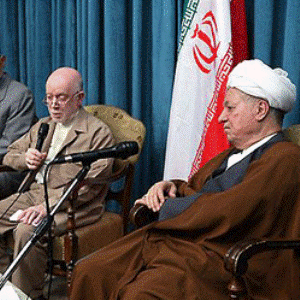Forgive and Forget

“Those reformists who have delineated borders with the Fetneh and thoroughly believe in velayat (1) and the Constitution can take part in the elections” said the Secretary General of the arch-conservative party Mo’talefe-ye Eslami Mohammad-Nabi Habibi. The Islamic Coalition Party, one of the most influential political groups in the Islamic Republic with a distinctive theory for Islamic rule, has now stepped beyond the conventional limits, assuming the role of the already disciplinarian Guardian Council to assert which Reformist strands are qualified to run for the parliamentary election scheduled to be hold in winter 2011.
Mo’talefeh may have had an influential role in driving towards victory and sustaining the Islamic Revolution, and its clout inside the power loci of the Islamic Republic is still significant, but could this authorize them to stipulate which groups can join an important political event such as parliamentary election?
But looking through another prism, Habibi’s –and other Principlists’- recent remark, juxtaposed with Mo’talefeh’s recent meeting with the nearly-ostracized Hashemi Rafsanjani, may be an attempt to talk the Reformists into spicing up an otherwise colorless election –“you can play, but wait, except your noisy ones” one can read into Habibi’s remarks from this p.o.v- and as Reformist journalists believe to soothe down the political turbulence plaguing Iran since the disputed 2099 presidential election.
Nonetheless, the general atmosphere of Iranian politics since the consequential presidential election does not promise a particularly healthy election. Reformists have not displayed zeal to pick up their slate and it seems that no effective reconciliation between the Reformists and Nezam will take place by the March 2012 election. In that case, infighting may be the Principlists’ only option; though they would take a shot to attract the sulky voters besides their traditional social base -which views voting as a religious and ideological duty.
Back to Mohammad-Nabi Habibi, the 70-year old Secretary General of the Islamic Coalition condescendingly adds: “naturally, Reformists’ participation in the election can be fruitful, but [only] the Reformists inside Nezam can compete with the Principlists in the upcoming election”. So it is clear that the Fetnehgar Reformists -the ‘mutineers’- who objected the 2009 election results and took to the streets along with protestors, have no chance to take part in the election. The good boys among the Reformists, however, still have this chance.
Nonetheless, Habibi’s remarks may have actually intended a different target, the third group among the Reformists, namely former President Mohammad Khatami and his inner circle. They are neither pariah politicians for the Nezam –as Musavi and Karroubi are, nor are they similar to the Reformist minority of the parliament who is willing to cling to its seats in the parliament at any cost. But will Khatami take Habibi up on his invitation? The answer is probably a no. Despite two recently controversial remarks regarding the parliamentary poll –in one which Khatami set preconditions for joining the election- Iran's former president appears apathetic towards the election.
During the recent days, the reticent Reformist cleric Seyyed Hadi Khamenei -Iranian Supreme Leader Ayatollah Seyyed Ali Khamenei’s brother- also spoke bitterly of the election: “during the recent years, allegations against the Reformist movement have amounted to thousands of hours [of speech] and shocking slanders have been targeted at the Reformists and critics [of the status quo] who have never been given a chance to respond. How can they be expected to join the election and enter this competition?”
The Reformist leaders are now toeing at the very borders of Nezam, borders which delimit insiders from outsiders. How are they going to react to the conditional invitation of the Principlists who –despite their previous professed unwillingness to let the Reformists into the game- are waiting for a response? The ball is now in the Reformists’ court who have to calculate if it is worth it to join the parliamentary election.
Velayat-e Faqih –translated as the Guardianship of the Jurisprudent- is the cornerstone of political theory of the Islamic Republic. According to the theory, during the absence of the 12th Shi’a Imam, Mahdi, religious and political affairs should be administered by the most qualified jurist –or faqih.

